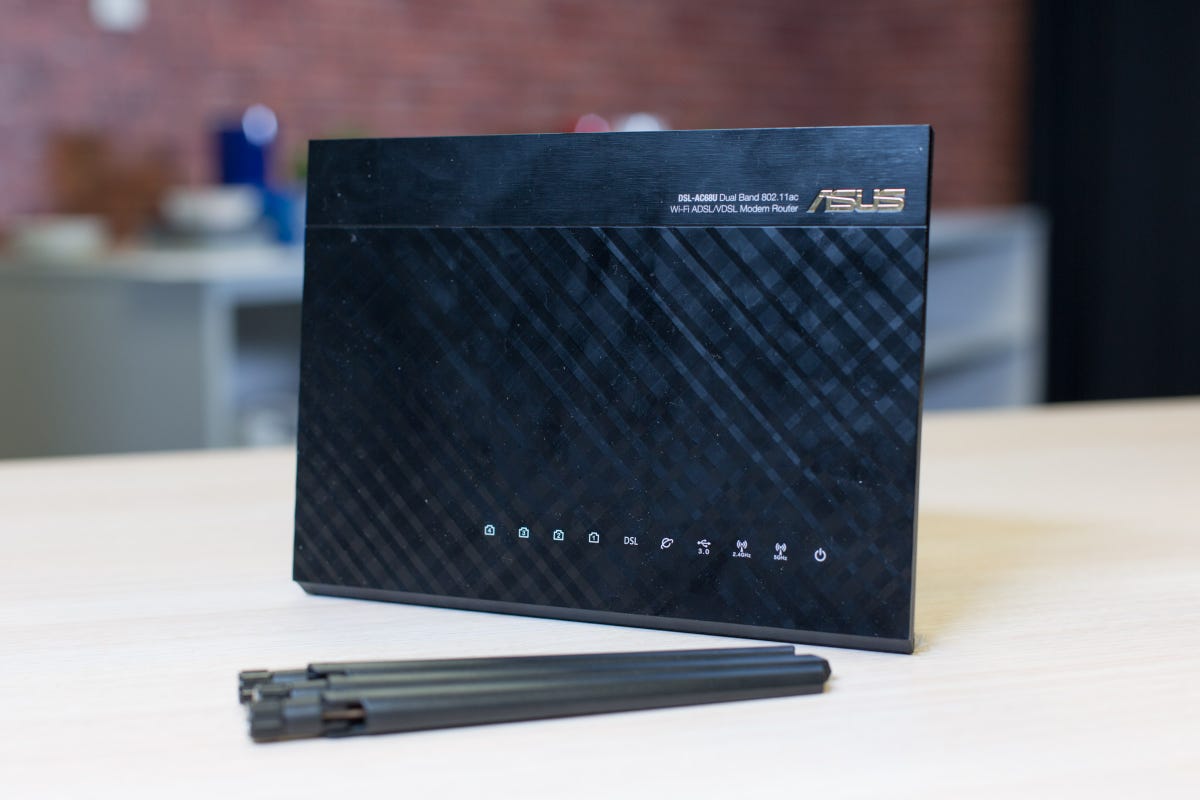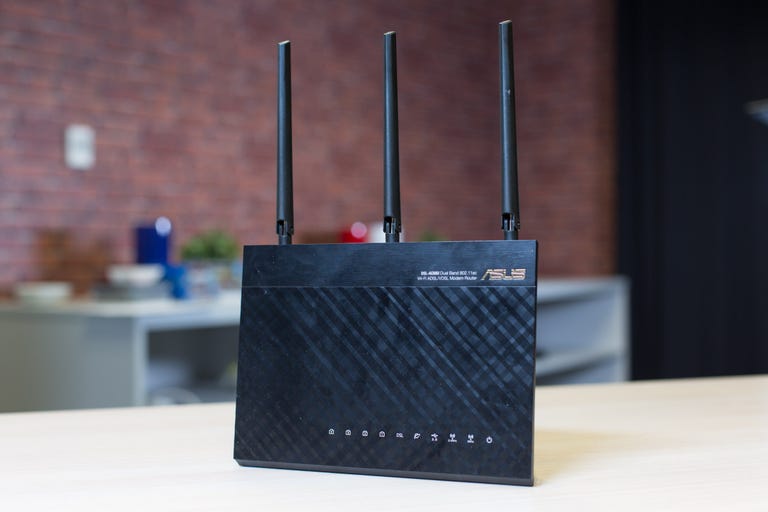 Why You Can Trust CNET
Why You Can Trust CNET Asus DSL-AC68U review: This top-flight modem-router almost does it all
Asus' 802.11ac modem-router is an absolute powerhouse, even with the slightly heavy price tag.
Asus has made a name for itself in the router game, typically providing high-performance units with plenty of flexibility. The DSL-AC68U continues the tradition.
The Good
The Bad
The Bottom Line
It's rated at 1,900Mbps -- that is, a single 802.11AC stream capable of 1,300Mbps, combined with a 2.4GHz stream rated up to 600Mbps. As these things go, no single device will ever see these speeds, but it does place the DSL-AC68U, at least at the time of writing and on paper, in the top performance bracket for modem/routers. This means it's quite pricey, coming in at around $319 in Australia, and £199 in the UK.
Design and ease of use
Asus' latest modem/router follows the same angular, black-on-black aesthetic of its predecessors. It combines a cross-hatched tactile pattern, faux-brushed-aluminium and matte black plastic that recalls a stealth fighter design, and is made to sit on a horizontal surface -- there's no wall mounting here.

The front has a range of useful status lights, showing individual 2.4 and 5GHz wireless activity, whether a USB device is plugged in, if there's an active Internet connection, whether there's DSL line sync and activity across the four Ethernet ports.
We should note Asus' power adapter here -- or "wall wart" as some call it -- it's incredibly small compared to its competitors, and I appreciated the extra room this gave at the power socket.
Asus includes a CD in the box that contains PDF manuals and tools for router discovery, printer setup and Windows-based firmware updating. My HP PhotoSmart 5510 was found quickly by Asus' utility, albeit with the confusing designation of CQ176A. Still, the test page printed fine.
Asus' web UI is attractive and simple to use, yet hides incredible depth. Its home page gives a quick glance of all the basic settings you need, including SSID, password and security settings; DSL status; connected clients and what USB device is connected. It even has a stats readout for the unit's CPU and RAM so you can see if it's struggling, although given the price we'd hope that'd never be the case.
Features
Asus includes the standard four gigabit Ethernet ports, and provides physical buttons for power and wireless on/off. While its competitors generally offer two USB ports, the DSL-AC68U only has one USB 3.0 port. The DSL-AC68U contains not only an ADSL2+ modem, but VDSL2 as well. Depending on broadband options in your region, this could be an attractive feature.
In its web UI Asus brings all the standard features we'd expect, and a bit more. You can activate up to six guest SSIDs, three on 2.4GHz and three on 5GHz. There's a traffic monitor for wired and wireless connections, and QoS settings cater for user configuration. The latter allows either IP or MAC identification, and five priority levels based on destination port, protocol or transmission size. Each priority level can be allocated a user-defined range of bandwidth availability for both uploads and downloads.
At first parental controls seem lacking with only time of day scheduling for Wi-Fi, but then you find the rest under the firewall category, offering URL and keyword blacklist options. An extensive set of system logs gives the user a better chance of identifying problems, while a mind-boggling array of manual wireless settings should keep even the uber geek happy.
Impressively for a consumer modem/router, the DSL-AC68U allows for dual WAN, either using the USB port hooked up to a 3G/4G modem, or an Ethernet port. It's able to use it in both fail over and load balance modes, which should be appealing to those for whom uptime is critical.
DDNS is supported, with Asus' own service, DynDNS, TZO, ZoneEdit, DNSOMatic, Tunnelbroker and No-IP making the list.
Asus has integrated cloud functionality into its router, which it calls "AiCloud 2.0". Cloud Disk will allow an Internet connected device to access USB storage attached to the modem/router, Smart Access lets SMB networked PC be accessed remotely, while Smart Sync with synchronize USB storage with Asus' own webstorage product.
USB functionality is expansive, including the aforementioned printer support; storage support with access over FTP and SMB; iTunes, Time Machine and DLNA compatibility and 3G/4G modem support including tethered Android phones.
Inside the box you'll also find a line filter, phone cable, Ethernet cable, warranty card and manual.
Performance
Testing was done with firmware 3.0.0.4.376_2072, and used iPerf to determine the maximum wireless speed at three locations: the next room, immediately upstairs with some furniture in the way, and one room away from immediately upstairs.
The wireless client used was an Asus G550 laptop with a 2x2 Intel AC7260 wireless card, as an indicator of average performance. Each WLAN is set to WPA2 personal encryption and a clear channel is chosen. Where possible the highest channel bandwidth is chosen, either 40 or 80MHz depending on the wireless standard. Where appropriate, transmission standard is set to 802.11n or 802.11AC only.
Due to the variable nature of wireless and surrounding WLANs, each unit was tested multiple times at various times of day to achieve a best case scenario performance value. Your own environment will see different results.
The DSL-AC68U is unable to run a pure 802.11n mode, so we tested 2.4GHz and AC only.
802.11n 2.4GHz performance
- Location 1
- Location 2
- Location 3
While not the fastest performer across the grade, Asus puts in an aggressive showing.
802.11ac performance
- Location 1
- Location 2
- Location 3
I've found most AC performance to be pretty similar across the field -- with the DSL-AC68U pulling the numbers it should. With a higher configuration wireless receiver we could potentially see more separation between the brands, but for the average laptop, it's much of a muchness.
Storage was tested over gigabit LAN with a SanDisk Extreme NTFS formatted 64GB USB 3.0 drive plugged into the fastest USB slot, transferring a 100MB file via SMB.
USB storage performance
- Read
- Write
While many routers come with USB 3.0 ports, you won't be seeing USB 3.0 performance. The Asus offers the fastest speeds of the premium 802.11ac modem/routers tested to date.
Conclusions
The DSL-AC68U is a strong contender with great all round performance and extensive options. You'll definitely pay for this privilege, but it's one I'd be happy to outlay for.



